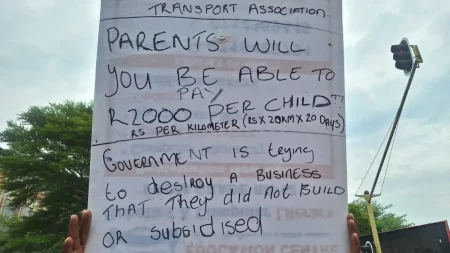In a significant development, the South African Department of Social Development (DSD) has made considerable progress in advancing the Basic Income Grant (BIG) policy. The policy aims to provide financial support for individuals aged 18 to 59, ensuring that vulnerable South Africans receive much-needed assistance to combat poverty and inequality.
With this in mind, the DSD is actively working on finalizing the policy to ensure it meets the needs of the population while maintaining financial feasibility.
This 2025 update also brings the good news that the Social Relief of Distress (SRD) provision has been extended, ensuring that recipients continue to receive support as the country works toward a more comprehensive and sustainable income grant system.
The Road to the Basic Income Grant
The Basic Income Grant (BIG) has been a topic of discussion in South Africa for more than two decades. Proposed as a way to provide a safety net for those without sufficient income, BIG was first discussed in the late 1990s as a way to address high levels of unemployment and poverty in the country.
In 1998, the proposal was put forward as a key part of South Africa’s efforts to alleviate poverty and reduce inequality. However, the proposal faced numerous obstacles, including a lack of political will and resistance from various sectors. Despite these setbacks, the conversation around a Basic Income Grant remained an important part of the social development agenda, with proposals being revisited periodically.
After years of research, discussion, and assessment, the current version of the policy is making significant headway. The first draft of the Basic Income Grant policy was submitted to the Social Protection, Community, and Human Development Cluster Cabinet Committee (SPCHD) in November 2024. Following consultations with various stakeholders, the department is now moving toward finalizing the policy framework for implementation.
Key Updates on the Policy
Several important updates have emerged as the DSD continues to refine the Basic Income Grant policy:
1. Policy Consultation and Stakeholder Engagement
In line with the Cabinet’s directive, the Department of Social Development held a series of workshops with key internal stakeholders to assess the policy’s feasibility and affordability. These consultations have focused on how to link BIS beneficiaries with sustainable employment opportunities and economic initiatives.
A follow-up workshop is scheduled for June 2025, marking another critical phase in the policy’s development. This workshop will aim to further refine the policy and ensure its alignment with broader national economic goals.
2. Bilateral Engagements with Key Government Entities
As part of the ongoing process, the DSD is engaging in bilateral discussions with other key government departments, including the Presidency, the Department of Employment and Labour, and National Treasury. These consultations are necessary to ensure the policy is financially viable and aligned with the country’s broader economic strategies.
Discussions with the National Treasury will also continue, focusing on the affordability of the proposed policy and the sustainability of its long-term goals.
3. Financial Feasibility
According to the Department of Social Development, a sub-team was created to assess the financial feasibility of the Basic Income Support policy. Based on economic modelling, the team concluded that the policy is financially viable, but consensus with National Treasury remains a key aspect of moving forward.
The department has emphasized that while the initial BIS grant will be set at the Lower Bound Poverty Line (LBPL), there are long-term plans to gradually increase it to the Upper Bound Poverty Line (UBPL) in the coming years.
4. Permanent SRD Grant
In the interim, the Social Relief of Distress (SRD) grant, which provides temporary assistance to individuals facing extreme poverty, has been extended for the 2025/26 financial year. This extension ensures that current recipients will continue to receive support until the new Basic Income Support system is fully implemented.
This extension is a critical safety net, especially for those who rely on the SRD grant for survival. As the government continues to work on the Basic Income Support policy, this temporary extension ensures that there is no gap in support during the transition.
A Look at the Historical Context
The idea of providing a Basic Income Grant (BIG) has been explored extensively in South Africa. While the first proposal was made in 1998, subsequent attempts to roll out the policy have been met with challenges. In 2002, a technical proposal for the BIG was drafted but ultimately failed to gain Cabinet approval.
The conversation around BIG was revived in 2021 and 2022, when an expert panel assessed the feasibility of implementing a Basic Income Support system in South Africa. This panel’s findings, coupled with recommendations from an Inter-Ministerial Committee (IMC) and an Inter-Departmental Task Team (IDTT) formed in 2007, have shaped the current policy framework.
The Importance of Linking BIG to Economic Opportunities
One of the key aspects of the current Basic Income Grant policy is its focus on connecting recipients to economic opportunities. During the interdepartmental workshops held by the DSD, stakeholders agreed that providing financial support alone is not enough to lift people out of poverty. The policy must also focus on sustainable livelihoods, including access to employment and skills development.
As the government refines the policy, it is working to ensure that BIS beneficiaries will be able to participate in the broader economy, either through employment, self-employment, or other economic initiatives. This will ensure that the policy’s benefits are long-lasting, and that recipients are empowered to improve their livelihoods in the long term.
Looking Ahead: What’s Next?
The Department of Social Development’s work on the Basic Income Grant policy is progressing steadily, with the final approval and implementation expected in the near future. Following consultations with key stakeholders, including National Treasury, the department will submit the revised policy to the SPCHD Cabinet Committee for approval in the second quarter of the 2025/26 financial year.
Once approved, the policy will be published for public comments, allowing citizens and stakeholders to weigh in on its details before it is finalized. This public consultation process will ensure that the final policy meets the needs of South Africans and reflects the broader goals of social protection and poverty alleviation.
A Step Toward a More Equitable Future
The Basic Income Grant policy represents a crucial step forward in South Africa’s efforts to combat poverty and inequality. If successfully implemented, it could provide much-needed relief to millions of South Africans, ensuring that vulnerable individuals have access to the financial support they need to survive and thrive.
While challenges remain in terms of finalizing the policy’s details and securing the necessary financial backing, the extension of the Social Relief of Distress grant and the continued consultations with key stakeholders show that the government is committed to creating a sustainable and effective social assistance system.
As South Africa continues to refine its social protection policies, the hope is that the Basic Income Support system will not only provide short-term relief but also contribute to long-term economic growth and social stability.










